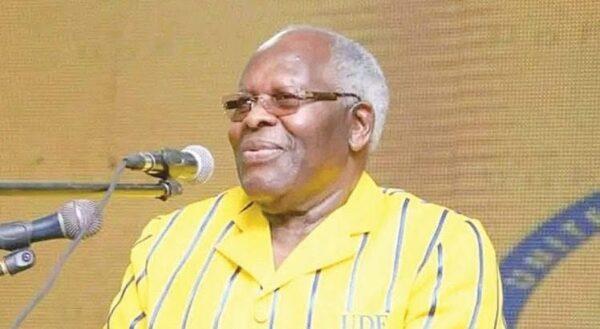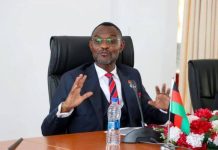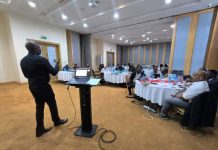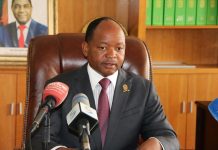By nyasatimes
Africa-Press – Malawi. In a rare public show of frustration and diplomatic exhaustion, Malawi’s former President Dr. Bakili Muluzi has officially withdrawn from the high-profile mediation process surrounding the late Zambian leader Edgar Chagwa Lungu’s protracted burial impasse — effectively signaling the end of his patience and faith in Zambia’s ability to resolve the matter amicably.
In a three-page statement dated 11th November 2025, Muluzi — who had been quietly leading behind-the-scenes mediation efforts between President Hakainde Hichilema’s administration and the Lungu family — announced his decision to step back, citing “the prevailing circumstances and the inability to secure a conclusive pathway forward.”
“It has now become necessary to withdraw from the mediation process and formally return the matter to the family, the Zambian people, the Zambian Government, and other processes,” Muluzi said bluntly. “This will allow the final arrangements for the burial of the departed Former President in a manner they will consider fitting and respectful.”
His statement — though couched in diplomatic language — dripped with resigned frustration, laying bare months of failed talks, growing political mistrust in Lusaka, and quiet regional embarrassment over a saga that has now dragged for nearly half a year.
The Peacemaker Walks Away
For months, Dr. Muluzi has been the face of a discreet Southern African mediation effort, quietly working alongside religious leaders, diplomats, and the governments of South Africa and Malawi to break the deadlock over the burial and national honors for the late Lungu, who died on 5th June 2025.
His withdrawal, therefore, is not just a personal retreat — it is a diplomatic earthquake. It signals the collapse of regional mediation efforts and an implicit admission that the Zambian political establishment remains too divided and too bitter to find common ground, even in death.
“Given the inability to secure a conclusive pathway forward,” Muluzi wrote, “it has become necessary to withdraw…”
That one line — terse, cold, and final — speaks volumes.
It marks the first time Muluzi, who has long championed peace diplomacy and Southern African solidarity, has openly conceded defeat in a mediation mission. And in doing so, he exposes what many in Lusaka and beyond have whispered privately: that political egos and vengeance have hijacked Zambia’s healing process.
A Diplomat’s Frustration Laid Bare
Behind Muluzi’s tone of “gratitude and solidarity” lies a deep sense of disillusionment. His statement meticulously thanks everyone from President Hichilema, to South African President Cyril Ramaphosa, to church leaders, and even to Grace Machel, but the courtesy reads almost like a eulogy for a failed mission.
“I remain deeply appreciative of President Hichilema’s readiness to receive my calls,” he noted — a sentence that, to the politically attuned, sounds less like praise and more like a subtle indictment of Hichilema’s hesitation to act decisively.
Muluzi’s carefully phrased withdrawal also raises uncomfortable questions:
Did regional diplomacy lose credibility?
Has Zambia’s leadership failed to rise above political grudges even in death?
And what does this public surrender say about SADC’s fading influence in resolving domestic disputes among member states?
A Mediation That Died Before the Burial
Perhaps most striking is Muluzi’s implicit acknowledgment that political interference made resolution impossible. His message, while tactful, paints a picture of deep dysfunction — a “process that has run its course,” as one regional diplomat put it privately.
Muluzi’s statement essentially hands the matter back to Zambia, urging them to “consider fitting and respectful closure.” That’s diplomatic shorthand for “you’re on your own.”
For a man once hailed as one of Africa’s elder statesmen of dialogue, the tone marks an uncharacteristic shift from optimism to resignation.
“May the soul of His Excellency Edgar Chagwa Lungu rest in eternal peace. May the people of Zambia be strengthened with wisdom, unity, and grace,” Muluzi concluded — a line that reads less as a blessing and more as a lament.
The Silence That Speaks Loudest
Muluzi’s decision lands as a quiet but powerful indictment of Zambia’s political leadership. For months, he and other regional figures — including Bishop Joshua Banda, Archbishop Alick Banda, and Graca Machel — had pleaded for calm and compromise. Yet even with church elders and SADC envoys on board, the burial dispute persisted.
Now, with Muluzi out, there’s no credible mediator left.
The withdrawal may appear diplomatic, but it carries a sting: Southern Africa’s moral authority just walked away from Zambia’s political quagmire, leaving behind a legacy of failed talks, bruised egos, and a nation still unable to bury one of its own.
Source: Malawi Nyasa Times
For More News And Analysis About Malawi Follow Africa-Press






